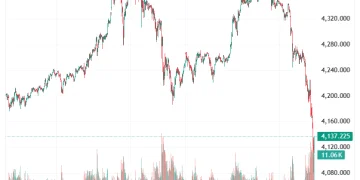The Asia-Pacific region is recovering from its worst recession in living memory. Our latest Regional Economic Outlook shows that a recovery started in the third quarter, but growth engines are not all firing with the same power across countries, leading to a multispeed recovery.
Reflecting worse-than-expected outturns in the second quarter in a few countries, the IMF’s forecast for the region has been downgraded to -2.2 percent in 2020—the worst outcome for this region in living memory.
India’s economy experienced a much sharper than expected contraction in the second quarter—24 percent on a year-over-year basis—and is expected to recover slowly in the coming quarters. China, which suffered the pandemic’s blow earlier than other countries, has seen a strong recovery after the first quarter lockdown, and growth has been revised up to 1.9 percent this year, a rare positive figure in a sea of negatives.
Advanced economies (Australia, Korea, Japan and New Zealand), while still in recession, are expected to do somewhat better than expected in 2020, reflecting a faster pickup in activity following earlier exit from lockdowns.
Drawn-out recovery
The good news is that we expect the region to grow by 6.9 percent in 2021. But even with this boost, output will be lower at the end of 2021 than our pre-pandemic projection.
The scars will be deep: with declining labor force participation and weak confidence dimming private investment, potential output by the middle of the decade could be some 5 percent lower than before the pandemic.

Lessons and Challenges
The Asia-Pacific region went into this crisis first and many of its economies are emerging from it first as well. What lessons can the world learn from this experience?
First, an early public health response, when infection rates were still low, was an essential steppingstone to flattening the virus curve. Second, relaxing containment measures only after the virus has been suppressed—and with appropriate post-lockdown policies (such as testing and contact-tracing) in place—is associated with better economic outcomes.
On both counts, Asia has done well in comparison to other regions, probably due to its experience from previous pandemics. Third, fiscal support has also been critical to reduce economic costs and underpin the recovery. Here Asia has pulled its weight with significant policy stimulus.

Risks ahead
Prospects for a global trade-led recovery look dim, because of weak global growth, closed borders, and festering tensions around trade, technology, and security—despite the boost to the region from China’s recovery.
Diversifying Asia’s economies away from over-reliance on exports is a work in progress: a fundamental reorientation toward domestic demand will take time and presents an exceptionally difficult challenge for the smallest economies (such as the Pacific islands) and more generally, those reliant on tourism.
Rising inequality is antithetical to sustainable inclusive recovery. Income and wealth inequality, already increasing before the pandemic, are likely to rise further unless decisive policy action is taken.
Asia’s labor market indicators have already deteriorated more than during the Global Financial Crisis, especially for women and younger workers. On top of that, redistributive policies in Asia are limited and the informal sector is large, making it difficult to reach and support the most vulnerable.
High indebtedness makes the region vulnerable to financial turbulence. While the unprecedented portfolio capital outflows seen at beginning of the pandemic have stabilized, thanks to monetary policy actions in advanced economies, net outflows remain large in comparison to pre-pandemic levels.
A renewed bout of tighter global financial conditions could worsen credit risks and financial stability, aggravate weak public and private sector balance sheets, and potentially push vulnerable countries into a debt crisis.
The road to strong, inclusive green growth
The health crisis is far from over. Policymakers’ first job is therefore to sustain strong health policies until the pandemic has abated. Timely testing, effective contact tracing, increases in hospital capacity, and improved healthcare systems remain priorities, especially for emerging markets and low-income countries in the region. Countries should plan now to secure and quickly distribute vaccine supplies when they become available, with multilateral support as needed.
Beyond the health response, a full arsenal of economic policies is needed to bolster Asia’s future.
First, fiscal and monetary support should not be withdrawn prematurely, that is, before the recovery gains traction.
Second, countries need to redouble efforts to protect their most vulnerable citizens from the crisis’ consequences through better targeting of fiscal support, especially to youth and women, who have taken the biggest hit. This is essential, because fiscal space is scarce or rapidly diminishing everywhere and acute inequality could still lead to social unrest if those at the bottom lose hope that better times lie ahead.
Third, vigilance against emerging credit risks in corporates and households remains essential, given potential impacts on financial institutions, particularly if growth is slower than expected.
High levels of debt are a key vulnerability in the region, especially given the weak financial position of many businesses before the crisis. It is also important to address unsustainable public debt proactively, as the clear message from history is that delays are very costly.
Fourth, to enable structural change, economic policies should be laser-focused on the world of tomorrow, not yesterday. This means facilitating corporate restructuring and resource reallocation, including to sectors that will pave the way for stronger medium-run inclusive green growth.
The message is clear: the region has the wherewithal to craft a better future for its citizens. With the right policies and international support when needed, Asia’s engines can work together again and power the region ahead.
The IMF stands ready to support the economies across Asia and the Pacific, with financing, policy advice, and capacity development tailored to the diverse needs in the region.








